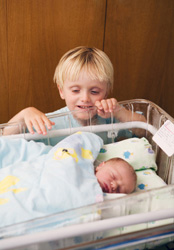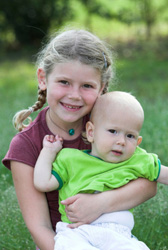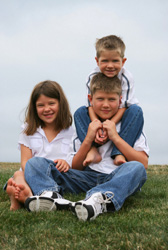
A father held his five-year-old daughter on his lap as he and his wife explained the family would soon be welcoming a new baby. The girl looked around after a few moments and asked, "But when it comes. . . where will I sit?"
Helping your children adjust to a new sibling can be a fun time, and it can also be a difficult one. There are ways to help it be a good experience for your older child.
Proactive Teaching
Helping your older child understand beforehand what will happen will smooth the transition. This is done by proactive teaching (Marchant and Young).
Discuss with children the ways family functioning will change so they can anticipate and respond in healthy ways to it.
You'll want to balance "reality" with a healthy sense of optimism. It is a good idea to explain that mom will be tired for a while after the baby is born, and that dad and mom will be spending a lot of time with the new baby.
A review of the ways the child could respond to the baby will have many benefits: teaching them to bring you diapers, how to sit and hold a baby, and other tasks will help them feel important.

Listen to Feelings
One great way to help your older child adjust to his new sibling comes from University of Michigan researchers. They suggest, "Listen" really listen to how your child feels about the baby and the changes in your family. Listening is a key to positive relationships. If they express negative feelings, acknowledge them" ("Your Child").
Though we deeply want our children to love each other from the moment they lay eyes on each other, real life may not play out that way.
Trying to force a relationship on a child who's not ready may actually have the opposite effect from what you intended; it can make an older child feel isolated and even resentful of the new baby.
Baby Behavior
Many parents notice that their older child actually regresses some when the baby is about to be born or just after he is born; potty training seems to come undone, or the toddler wants a bottle or "blanky," like the baby has.
This is normal, and acknowledging your older child's desire to feel soothed is appropriate. Allowing some "baby" behavior can help you give your older child what he needs, while allowing you to decide which behaviors are acceptable to you and which aren't.
Sibling Classes
Hospitals often sponsor "sibling classes," where expecting siblings can go and see where their very own new brother or sister will be bathed for the first time, where mom will be staying, and what they can do to be a great big brother or sister. This proactive teaching can ease some of the anxiety children feel when parents seemingly disappear off to the hospital, and even help them feel more excited (instead of overwhelmed) when they get to meet their sibling for the first time.
Look At You!
Because your older child might be yearning to be small again, you can help him feel special by pointing out the many things he has learned and can do. "Because you're so big you can buckle your seat belt all by yourself," and "Only big boys get to go to birthday parties on their own," and so on. Even simply having your oldest help you load baby diapers in the shopping cart (and be involved with other baby preparations) can help him feel a sense of happiness that he is "big."
Picture Books
There are dozens of great picture books geared toward helping children adjust to a new brother or sister, and they have a wide range of variation in how detailed they are about birth and reproduction. (Preview any recommendation, just to make sure the topics are handled in a way you feel comfortable with.) A couple of titles you might enjoy are: Julius, the Baby of the World, by Kevin Henkes. The New Baby, by Fred Rogers. My Brother, Will, by Joan Robbins.
Fetal Development
There are great books about baby development and growth "A Child Is Born," by Lennart Nilsson (remember those amazing photos in Life magazine years and years ago?) is still one of the benchmark books. Your child (and you!) can have fun watching the baby grow in the book as your baby grows in real life.
Home Videos
It can be fun to watch your older child's birth videos and look at his newborn pictures with him to help him understand you went through the very same things with him when he was a newborn. "We bathed you in the sink, and you'll get to see exactly how we did it!"
Gifts
Having a stash of "big kid gifts" (nothing expensive necessary, there are plenty of items at the dollar store that only "big kids" can have) can come in handy to balance out the many gifts the newborn will be receiving. Even allowing the older child to open the baby's gifts, or requesting from those closest to you that they bring a gift for the older child instead of the baby, can help make the baby's attention more palatable to them. Perhaps the new baby could even "bring" gifts to the new brothers and sisters.
One-On-One
Many concerns are focused around the question: Do Mom and Dad love him more than they love me? You may carve out some one-on-one parent-child (especially Mommy-child) time with your older child soon after the baby's birth. You don't need to plan anything spectacular. Just putting a puzzle together, uninterrupted, in another room of the house can reassure your older child that he is loved and special.
Coming Home
Because Mom has been absent from daily family life during the birth and some time after, one great suggestion for bringing a baby home comes from a pediatrician who is also a mom, "Have Daddy carry the infant into the house so that Mommy has both arms free for all the hugging that needs to take place" (Iovine 225).

With careful preparation and attention to the thoughts and feelings of your older child, you can help him adjust to a new sibling. While you get to lay the foundation for their relationship, it will ultimately take on a life of its own and become theirs.
Whatever the sibling make up of the family you create, you can always reassure your children that love expands, and that there's enough room in your family for every member.
Sources
Iovine, Vicki. The Girlfriends' Guide to Toddlers. New York: A Perigee Book, The Berkley Publishing Group, 1999.
Marchant, M. & Young, R. (2005). 3 B's of effective parenting: Be proactive, be positive, and be consistent. Marriage and Families, (Winter), 18-25.
Your Child. Home page. University of Michigan Health Systems.12 Dec. 2006.